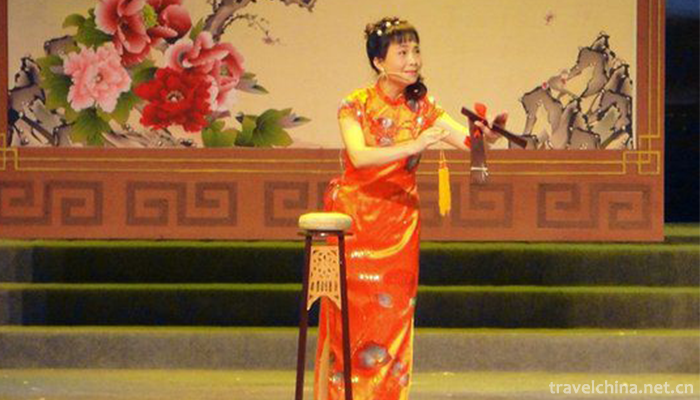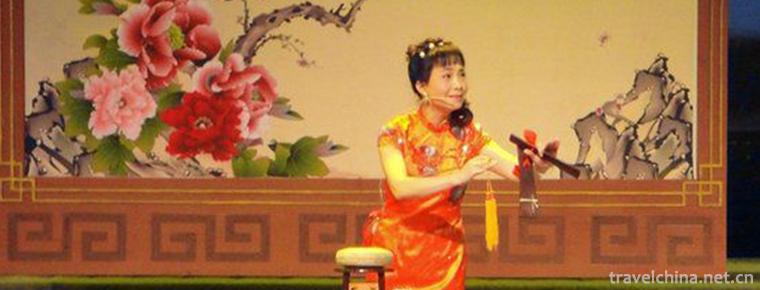Nanping Nanci
Nanping Nanci
Nanping Southern Ci is a traditional form
of music popular in Nanping, northern Fujian Province. It is generally believed
that the Southern Ci in Jiangnan area developed gradually with the local
traditional folk song minor after it was introduced from Suzhou to Nanping in
the Qing and Jiaqing Dynasties. The performance form of Nanping Nanci is
composed of one lead singer, and many other people sit around with different instruments,
and sing in turn according to different lines.
Nanping Nanci has some problems in today's
development. There are few successors and many difficulties. It is urgent to
support and protect Nanping Nanci.
The state attaches great importance to the
protection of intangible cultural heritage. On May 20, 2006, the opera was
approved by the State Council and listed in the first batch of national
intangible cultural heritage list.
Historical Origin
Nanci opera is popular in Nanping area of
Fujian province. Legend has it that it was developed from Tanhuang minor.
During the reign of Qianlong and Jiaqing in the Qing Dynasty (1736-1820),
Tanhuang minor was introduced from Suzhou to Nanping, and combined with the
traditional folk art of northern Fujian to form its own unique style.
Originally in Tanhuang minor, both singing and Bai were in Suzhou "Tuguan
dialect", mainly singing, and sometimes speaking. There are two types of
tunes, major and minor, with eight rhymes of Southern Ci as its basic tone.
Because Tan Spring was directly influenced by Suzhou Kunqu Opera, it retained
some music cards such as crying Yanhui, , ,
. Most of the songs sung in the Qing Dynasty come from Kunqu
Opera, such as Broken Bridge, Qiujiang, Out of the Fortress, Legend of White
Snake, West Chamber, Moonworship and so on. From the middle of Qing Dynasty to
the Republic of China, Nanci developed in Nanping. During the Jiaqing period of
the Qing Dynasty (1796-1820), the first class club was called Jingyixuan.
During the reign of Qing Daoguang (1821-1850), there were "to form a
community", "Tongzhi Decade of Qing Dynasty
(1871),"Sandetang"organized by Catholics in Nanping,
and"Tongyuexuan"in the reign of Qing Guangxu (1875-1908),
and"Heming Society"and"Geng Yunqin Society"in the period of
5-35 (1916-1946) of the Republic of China. In the 26 years of the Republic of
China (1937), Yuankeng Zefang farmers in Shunchang spontaneously organized the
"Lechun Society".
artistic characteristics
Southern Ci is a form of sitting and
singing, with three, five or more singers ranging from Yangqin, Sanxian, Pipa,
Sheng, Sudi, Huhu, gong, cymbal, cymbal, drum and other musical instruments,
singing while playing, mostly in Kunqu opera, its rhythm is graceful and
graceful. Later, in order to make the elegant Kunqu Ci easy to understand,
Nanci gradually changed its long and short sentences to seven-character
sentences in order to adapt to the taste of urban and rural middle and lower
class audiences.
Commonly known as the "Eight Rhymes
Southern Ci", that is, singing eight lines, one rhyme, the ancient name of
the "Eight Rhymes" traditional repertoire are: Hunting Back, Zhaojun
Fortress, White Snake Biography, Monk and Nun Club, Peony to Medicine, Western
Chamber, borrowing clothes to persuade friends, and other plays and folding
operas, after liberation, more than 60 scripts have been sorted out.
Inheritance value
Nan Ci was introduced to Nanping in the
late 18th century. Just after it was introduced, the famous activity class
"Jing Yi Xuan" appeared. It has been more than 200 years since then.
There have been nine generations of inheritance. Its artistic tradition is
quite profound and its artistic vitality is very tenacious. However, there are
some problems in the development of Nanping's Nanci today. There are few
successors and many difficulties. It is urgent to support and protect Nanping's
Nanci.
Successful application
The state attaches great importance to the
protection of intangible cultural heritage. On May 20, 2006, the opera was
approved by the State Council and listed in the first batch of national
intangible cultural heritage list.


-
2.Chengdu Maoye JW Marriott Hotel
Chengdu Maoye JW Marriott Hotel is located in Tianfu Square, the heartland of Chengdu. It is about 30 minutes'drive from Chengdu Shuangliu International Airport to the hotel, opening the extraordinary
Time 2018-12-16 -
3.Swan Lake National Urban Wetland Park
Swan Lake National Urban Wetland Park, located in the ecological zone between the East and West urban areas of Sanmenxia City, covers an area of 8 850 mu, including 6 150 mu of land
Time 2019-02-21 -
4.Gulin lantern
Gulin lanterns, centered on Gulin, are widely distributed in the middle reaches of Chishui River at the junction of Sichuan, Guizhou and Yunnan provinces.
Time 2019-05-01 -
5.Hebei Bangzi
Hebei Bangzi is an important branch of Bangzi vocal cavity in China. It was formed in the Qing Dynasty (1821 - 1850), and entered a prosperous period in the early years of Qing Guangxu
Time 2019-05-02 -
6.Nau Song of Jingpo Ethnic Group
The Jingpo Munao Longitudinal Song is the most solemn traditional national festival of the Jingpo nationality and one of the national intangible cultural heritages.
Time 2019-05-08 -
7.Wheat straw cut and paste
Straw clipping is a traditional folk handicraft. Also known as "wheat straw clipping", "wheat straw clipping". Using the natural luster of wheat straw and the characteristics of ru
Time 2019-05-16 -
8.A tune of mountain climbing
Mountain climbing tune, also known as mountain climbing song and mountain song, is a traditional short-tune folk song popular in the agricultural and semi-agricultural and semi-pastoral areas of centr
Time 2019-06-08 -
9.Sharipol wrestling
Shaliboer style wrestling is a national traditional sports event originally created and retained by the Weilat Mongolian people. It is one of the main sports events in the Uznada Mu Grand Event in Ala
Time 2019-06-12 -
10.Eagle Claw
Eagle Claw Turn Boxing is a new type of Chinese traditional boxing, which is derived from the Eight Flash Turn. It is also a famous Chinese national master, Mr. Chen Zizheng (1878-1933) (from Li Linzh
Time 2019-07-14 -
11.Guangan bus
In the main urban area of Guang'an City, there are not only urban buses directly to Deng Xiaoping's hometown scenic spot, Shenlong mountain Ba Ren stone city, Siyuan square, but also one-day tour through bus to Huaying Mountain, baoz
Time 2020-12-19 -
12.Dazhou environmental protection
In 2019, the afforestation area of Dazhou city is 11666.60 hectares, the forest area is 735300 hectares, and the forest coverage rate is 44.34%. The air, water and soil pollution prevention and control were carried out in depth. The air compliance rate
Time 2020-12-20